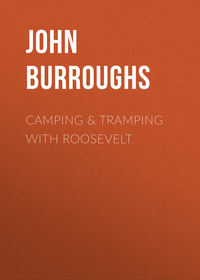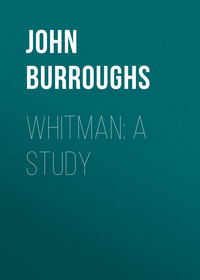 полная версия
полная версияWays of Nature
I was told of a fox that came nightly prowling about some deadfalls set for other game. The new-fallen snow each night showed the movements of the suspicious animal; it dared not approach nearer than several feet to the deadfalls. Then one day a red-shouldered hawk seized the bait in one of the traps, and was caught. That night a fox, presumably the same one, came and ate such parts of the body of the hawk as protruded from beneath the stone. Now, how did the fox know that the trap was sprung and was now harmless? Did not its act imply something more than instinct? We have the cunning and suspicion of the fox to start with; these are factors already in the problem that do not have to be accounted for. To the fox, as to the crow, anything that looks like design or a trap, anything that does not match with the haphazard look and general disarray of objects in nature, will put it on its guard. A deadfall is a contrivance that is not in keeping with the usual fortuitous disarray of sticks and stones in the fields and woods. The odor of the man's hand would also be there, and this of itself would put the fox on its guard. But a hawk or any other animal crushed by a stone, with part of its body protruding from beneath the stone, has quite a different air. It at least does not look threatening; the rock is not impending; the open jaws are closed. More than that, the smell of the man's hand would be less apparent, if not entirely absent. The fox drew no rational conclusions; its instinctive fear was allayed by the changed conditions of the trap. The hawk has not the fox's cunning, hence it fell an easy victim. I do not think that the cunning of the fox is any more akin to reason than is the power of smell of the hound that pursues him. Both are inborn, and are quite independent of experience. If a fox were deliberately to seek to elude the hound by running through a flock of sheep, or by following the bed of a shallow stream, or by taking to the public highway, then I think we should have to credit him with powers of reflection. It is true he often does all these things, but whether he does them by chance, or of set purpose, admits of doubt.
The cunning of a fox is as much a part of his inherited nature as is his fleetness of foot. All the more notable fur-bearing animals, as the fox, the beaver, the otter, have doubtless been persecuted by man and his savage ancestors for tens of thousands of years, and their suspicion of traps and lures, and their skill in eluding them, are the accumulated inheritance of ages.
In denying what we mean by thought or free intelligence to animals, an exception should undoubtedly be made in favor of the dog. I have else where said that the dog is almost a human product; he has been the companion of man so long, and has been so loved by him, that he has come to partake, in a measure at least, of his master's nature. If the dog does not at times think, reflect, he does something so like it that I can find no other name for it. Take so simple an incident as this, which is of common occurrence: A collie dog is going along the street in advance of its master's team. It comes to a point where the road forks; the dog takes, say, the road to the left and trots along it a few rods, and then, half turning, suddenly pauses and looks back at the team. Has he not been struck by the thought, "I do not know which way my master is going: I will wait and see"? If the dog in such cases does not reflect, what does he do? Can we find any other word for his act? To ask a question by word or deed involves some sort of a mental process, however rudimentary. Is there any other animal that would act as the collie did under like circumstances?
A Western physician writes me that he has on three different occasions seen his pointer dog behave as follows: He had pointed a flock of quail, that would not sit to be flushed, but kept running. Then the dog, without a word or sign from his master, made a long détour to the right or to the left around the retreating birds, headed them off, and then slowly advanced, facing the gunner, till he came to a point again, with the quail in a position to be flushed. After crediting the instinct and the training of the dog to the full, such an act, I think, shows a degree of independent judgment. The dog had not been trained to do that particular thing, and took the initiative of his own accord.
Many authentic stories are told of cats which seem to show that they too have profited in the way of added intelligence by their long intercourse with man. A lady writing to me from New York makes the following discriminating remarks upon the cat: —
"It seems to me that the reason which you ascribe for the semi-humanizing of the dog, his long intercourse with man, might apply in some degree to the cat. But it is necessary to be very fond of cats in order to perceive their qualities. The dog is 'up in every one's face,' so to speak; always in evidence; always on deck. But the cat is a shy, reserved, exclusive creature. The dog is the humble friend, follower, imitator, and slave of man. He will lick the foot that kicks him. The cat, instead, will scratch. The dog begs for notice. The cat must be loved much and courted assiduously before she will blossom out and humanize under the atmosphere of affection. The dog seems to me to have the typical qualities of the negro, the cat of the Indian. She is indifferent to man, cares nothing for him unless he wins her by special and consistent kindness, and throughout her long domestication has kept her wild independence, and ability to forage for herself when turned loose, whether in forest or city street. It is when she is much loved and petted that her intelligence manifests itself, in such quiet ways that an indifferent observer will never notice them. But she always knows who is fond of her, and which member of the family is fondest of her."
The correspondent who had the experience with his pointer dog relates this incident about his blooded mare: A drove of horses were pasturing in a forty-acre lot. The horses had paired off, as horses usually do under such circumstances. The doctor's thoroughbred mare had paired with another mare that was totally blind, and had been so since a colt. Through the field "ran a little creek which could not well be crossed by the horses except at a bridge at one end." One day when the farmer went to salt the animals, they all came galloping over the bridge and up to the gate, except the blind one; she could not find the bridge, and remained on the other side, whinnying and stamping, while the others were getting their salt a quarter of a mile away. Presently the blooded mare suddenly left her salt, made her way through the herd, and went at a flying gallop down across the bridge to the blind animal. Then she turned and came back, followed by the blind one. The doctor is convinced that his mare deliberately went back to conduct her blind companion over the bridge and down to the salt-lick. But the act may be more simply explained. How could the mare have known her companion was blind? What could any horse know about such a disability? The only thing implied in the incident is the attachment of one animal for another. The mare heard her mate calling, probably in tones of excitement or distress, and she flew back to her. Finding her all right, she turned toward the salt again and was followed by her fellow. Instinct did it all.
My own observation of the wild creatures has revealed nothing so near to human thought and reflection as is seen in the cases of the collie and pointer dogs above referred to. The nearest to them of anything I can now recall is an incident related by an English writer, Mr. Kearton. In one of his books, Mr. Kearton relates how he has frequently fooled sitting birds with wooden eggs. He put his counterfeits, painted and marked like the originals, into the nests of the song thrush, the blackbird, and the grasshopper warbler, and in no case was the imposition detected. In the warbler's nest he placed dummy eggs twice the size of her own, and the bird proceeded to brood them without the slightest sign of suspicion that they were not of her own laying.
But when Mr. Kearton tried his counterfeits upon a ring plover, the fraud was detected. The plover hammered the shams with her bill "in the most skeptical fashion," and refused to sit down upon them. When two of the bird's own eggs were returned to the nest and left there with two wooden ones, the plover tried to throw out the shams, but failing to do this, "reluctantly sat down and covered good and bad alike."
Now, can the action of the plover in this case be explained on the theory of instinct alone? The bird could hardly have had such an experience before. It was offered a counterfeit, and it behaved much as you or I would have done under like conditions, although we have the general idea of counterfeits, which the plover could not have had. Of course, everything that pertains to the nest and eggs of a bird is very vital to it. The bird is wise about these things from instinct. Yet the other birds were easily fooled. We do not know how nearly perfect Mr. Kearton's imitation eggs were, but evidently there was some defect in them which arrested the bird's attention. If the incident does not show powers of reflection in the bird, it certainly shows keen powers of perception; and that birds, and indeed all animals, show varying degrees of this power, is a matter of common observation. I hesitate, therefore, to say that Mr. Kearton's plover showed anything more than very keen instincts. Among our own birds there is only one, so far as I know that detects the egg of the cowbird when it is laid in the bird's nest, and that is the yellow warbler. All the other birds accept it as their own, but this warbler detects the imposition, and proceeds to get rid of the strange egg by burying it under a new nest bottom.
Man is undoubtedly of animal origin. The road by which he has come out of the dim past lies through the lower animals. The germ and potentiality of all that he has become or can become was sleeping there in his humble origins. Of this I have no doubt. Yet I think we are justified in saying that the difference between animal intelligence and human reason is one of kind and not merely of degree. Flying and walking are both modes of locomotion, and yet may we not fairly say they differ in kind? Reason and instinct are both manifestations of intelligence, yet do they not belong to different planes? Intensify animal instinct ever so much, and you have not reached the plane of reason. The homing instinct of certain animals is far beyond any gift of the kind possessed by man, and yet it seems in no way akin to reason. Reason heeds the points of the compass and takes note of the topography of the country, but what can animals know of these things?
And yet I say the animal is father of the man. Without the lower orders, there could have been no higher. In my opinion, no miracle or special creation is required to account for man. The transformation of force, as of heat into light or electricity, is as great a leap and as mysterious as the transformation of animal intelligence into human reason.
XIII
READING THE BOOK OF NATURE
In studying Nature, the important thing is not so much what we see as how we interpret what we see. Do we get at the true meaning of the facts? Do we draw the right inference? The fossils in the rocks were long observed before men drew the right inference from them. So with a hundred other things in nature and life.
During May and a part of June of 1903, a drouth of unusual severity prevailed throughout the land. The pools and marshes nearly all dried up. Late in June the rains came again and filled them up. Then an unusual thing happened: suddenly, for two or three days and nights, the marshes about me were again vocal with the many voices of the hyla, the "peepers" of early spring. That is the fact. Now, what is the interpretation? With me the peepers become silent in early May, and, I suppose, leave the marshes for their life in the woods. Did the drouth destroy all their eggs and young, and did they know this and so come back to try again? How else shall one explain their second appearance in the marshes? But how did they know of the destruction of their young, and how can we account for their concerted action? These are difficulties not easily overcome. A more rational explanation to me is this, namely, that the extreme dryness of the woods – nearly two months without rain – drove the little frogs to seek for moisture in their spring haunts, where in places a little water would be pretty certain to be found. Here they were holding out, probably hibernating again, as such creatures do in the tropics during the dry season, when the rains came, and here again they sent up their spring chorus of voices, and, for aught I know, once more deposited their eggs. This to me is much more like the ways of Nature with her creatures than is the theory of the frogs' voluntary return to the swamps and pools to start the season over again.
The birds at least show little or no wit when a new problem is presented to them. They have no power of initiative. Instinct runs in a groove, and cannot take a step outside of it. One May day we started a meadowlark from her nest. There were three just hatched young in the nest, and one egg lying on the ground about two inches from the nest. I suspected that this egg was infertile and that the bird had had the sense to throw it out, but on examination it was found to contain a nearly grown bird. The inference was, then, that the egg had been accidentally carried out of the nest some time when the sitting bird had taken a sudden flight, and that she did not have the sense to roll or carry it back to its place.
There is another view of the case which no doubt the sentimental "School of Nature Study" would eagerly adopt: A very severe drouth reigned throughout the land; food was probably scarce, and was becoming scarcer; the bird foresaw her inability to care for four young ones, and so reduced the possible number by ejecting one of the eggs from the nest. This sounds pretty and plausible, and so credits the bird with the wisdom that the public is so fond of believing it possesses. Something like this wisdom often occurs among the hive bees in seasons of scarcity; they will destroy the unhatched queens. But birds have no such foresight, and make no such calculations. In cold, backward seasons, I think, birds lay fewer eggs than when the season is early and warm, but that is not a matter of calculation on their part; it is the result of outward conditions.
A great many observers and nature students at the present time are possessed of the notion that the birds and beasts instruct their young, train them and tutor them, much after the human manner. In the familiar sight of a pair of crows foraging with their young about a field in summer, one of our nature writers sees the old birds giving their young a lesson in flying. She says that the most important thing that the elders had to do was to teach the youngsters how to fly. This they did by circling about the pasture, giving a peculiar call while they were followed by their flock – all but one. This was a bobtailed crow, and he did not obey the word of command. His mother took note of his disobedience and proceeded to discipline him. He stood upon a big stone, and she came down upon him and knocked him off his perch. "He squawked and fluttered his wings to keep from falling, but the blow came so suddenly that he had not time to save himself, and he fell flat on the ground. In a minute he clambered back upon his stone, and I watched him closely. The next time the call came to fly he did not linger, but went with the rest, and so long as I could watch him he never disobeyed again." I should interpret this fact of the old and young crows flying about a field in summer quite differently. The young are fully fledged, and are already strong flyers, when this occurs. They do not leave the nest until they can fly well and need no tutoring. What the writer really saw was what any one may see on the farm in June and July: she saw the parent crows foraging with their young in a field The old birds flew about, followed by their brood, clamorous for the food which their parents found. The bobtailed bird, which had probably met with some accident, did not follow, and the mother returned to feed it; the young crow lifted its wings and flapped them, and in its eagerness probably fell off its perch; then when its parent flew away, it followed.
I think it highly probable that the sense or faculty by which animals find their way home over long stretches of country, and which keeps them from ever being lost as man so often is, is a faculty entirely unlike anything man now possesses. The same may be said of the faculty that guides the birds back a thousand miles or more to their old breeding-haunts. In caged or housed animals I fancy this faculty soon becomes blunted. President Roosevelt tells in his "Ranch Life" of a horse he owned that ran away two hundred miles across the plains, swimming rivers on the way to its old home. It is very certain, I think, that this homing feat is not accomplished by the aid of either sight or scent, for usually the returning animal seems to follow a comparatively straight line. It is, or seems to be, a consciousness of direction that is as unerring as the magnetic needle. Reason, calculation, and judgment err, but these primary instincts of the animal seem almost infallible.
In Bronx Park in New York a grebe and a loon lived together in an inclosure in which was a large pool of water. The two birds became much attached to each other and were never long separated. One winter day on which the pool was frozen over, except a small opening in one end of it, the grebe dived under the ice and made its way to the far end of the pool, where it remained swimming about aimlessly for some moments. Presently the loon missed its companion, and with an apparent look of concern dived under the ice and joined it at the closed end of the pool. The grebe seemed to be in distress for want of air. Then the loon settled upon the bottom, and with lifted beak sprang up with much force against the ice, piercing it with its dagger-like bill, but not breaking it. Down to the bottom it went again, and again hurled itself up against the ice, this time shattering it and rising to the surface, where the grebe was quick to follow. Now it looked as if the loon had gone under the ice to rescue its friend from a dangerous situation, for had not the grebe soon found the air, it must have perished, and persons who witnessed the incident interpreted it in this way. It is in such cases that we are so apt to read our human motives and emotions into the acts of the lower animals. I do not suppose the loon realized the danger of its companion, nor went under the ice to rescue it. It followed the grebe because it wanted to be with it, or to share in any food that might be detaining it there, and then, finding no air-hole, it proceeded to make one, as it and its ancestors must often have done before. All our northern divers must be more or less acquainted with ice, and must know how to break it. The grebe itself could doubtless have broken the ice had it desired to. The birds and the beasts often show much intelligence, or what looks like intelligence, but, as Hamerton says, "the moment we think of them as human, we are lost."
A farmer had a yearling that sucked the cows. To prevent this, he put on the yearling a muzzle set full of sharpened nails. These of course pricked the cows, and they would not stand to be drained of their milk. The next day the farmer saw the yearling rubbing the nails against a rock in order, as he thought, to dull them so they would not prick the cows! How much easier to believe that the beast was simply trying to get rid of the awkward incumbrance upon its nose. What can a calf or a cow know about sharpened nails, and the use of a rock to dull them? This is a kind of outside knowledge – outside of their needs and experiences – that they could not possess.
An Arizona friend of mine lately told me this interesting incident about the gophers that infested his cabin when he was a miner. The gophers ate up his bread. He could not hide it from them or put it beyond their reach. Finally, he bethought him to stick his loaf on the end of a long iron poker that he had, and then stand up the poker in the middle of his floor. Still, when he came back to his cabin, he would find his loaf eaten full of holes. One day, having nothing to do, he concluded to watch and see how the gophers reached the bread, and this was what he saw: The animals climbed up the side of his log cabin, ran along one of the logs to a point opposite the bread, and then sprang out sidewise toward the loaf, which each one struck, but upon which only one seemed able to effect a lodgment. Then this one would cling to the loaf and act as a stop to his fellows when they tried a second time, his body affording them the barrier they required. My friend felt sure that this leader deliberately and consciously aided the others in securing a footing on the loaf. But I read the incident differently. This successful jumper aided his fellows without designing it. The exigencies of the situation compelled him to the course he pursued. Having effected a lodgment upon the impaled loaf, he would of course cling to it when the others jumped so as not to be dislodged, thereby, willy nilly, helping them to secure a foothold. The coöperation was inevitable, and not the result of design.
The power to see straight is the rarest of gifts; to see no more and no less than is actually before you; to be able to detach yourself and see the thing as it actually is, uncolored or unmodified by your own sentiments or prepossessions. In short, to see with your reason as well as with your perceptions, that is to be an observer and to read the book of nature aright.
XIV
GATHERED BY THE WAY
I. THE TRAINING OF WILD ANIMALSI was reminded afresh of how prone we all are to regard the actions of the lower animals in the light of our own psychology on reading "The Training of Wild Animals," by Bostock, a well-known animal-trainer. Bostock evidently knows well the art of training animals, but of the science of it he seems to know very little. That is, while he is a successful trainer, his notions of animal psychology are very crude. For instance, on one page he speaks of the lion as if it were endowed with a fair measure of human intelligence, and had notions, feelings, and thoughts like our own; on the next page, when he gets down to real business, he lays bare its utter want of these things. He says a lion born and bred in captivity is more difficult to train than one caught from the jungle. Then he gives rein to his fancy. "Such a lion does not fear man; he knows his own power. He regards man as an inferior, with an attitude of disdain and silent hauteur." "He accepts his food as tribute, and his care as homage due." "He is aristocratic in his independence." "Deep in him – so deep that he barely realizes its existence – slumbers a desire for freedom and an unutterable longing for the blue sky and the free air." When his training is begun, "he meets it with a reserved majesty and silent indifference, as though he had a dumb realization of his wrongs." All this is a very human way of looking at the matter, and is typical of the way we all – most of us – speak of the lower animals, defining them to ourselves in terms of our own mentality, but it leads to false notions about them. We look upon an animal fretting and struggling in its cage as longing for freedom, picturing to itself the joy of the open air and the free hills and sky, when the truth of the matter undoubtedly is that the fluttering bird or restless fox or lion simply feels discomfort in confinement. Its sufferings are physical, and not mental. Its instincts lead it to struggle for freedom. It reacts strongly against the barriers that hold it, and tries in every way to overcome them. Freedom, as an idea, or a conception of a condition of life, is, of course, beyond its capacity.
Bostock shows how the animal learns entirely by association, and not at all by the exercise of thought or reason, and yet a moment later says: "The animal is becoming amenable to the mastery of man, and in doing so his own reason is being developed," which is much like saying that when a man is practicing on the flying trapeze his wings are being developed. The lion learns slowly through association – through repeated sense impressions. First a long stick is put into his cage. If this is destroyed, it is replaced by another, until he gets used to it and tolerates its presence. Then he is gently rubbed with it at the hands of his keeper. He gets used to this and comes to like it. Then the stick is baited with a piece of meat, and in taking the meat the animal gets still better acquainted with the stick, and so ceases to fear it. When this stage is reached, the stick is shortened day by day, "until finally it is not much longer than the hand." The next step is to let the hand take the place of the stick in the stroking process. "This is a great step taken, for one of the most difficult things is to get any wild animal to allow himself to be touched with the human hand." After a time a collar with a chain attached is slipped around the lion's neck when he is asleep. He is now chained to one end of the cage. Then a chair is introduced into the cage; whereupon this king of beasts, whose reason is being developed, and who has such clear notions of inferior and superior, and who knows his own powers, usually springs for the chair, seeking to demolish it. His tether prevents his reaching it, and so in time he tolerates the chair. Then the trainer, after some preliminary feints, walks into the cage and seats himself in the chair. And so, inch by inch, as it were, the trainer gets control of the animal and subdues him to his purposes, not by appealing to his mind, for he has none, but by impressions upon his senses.









